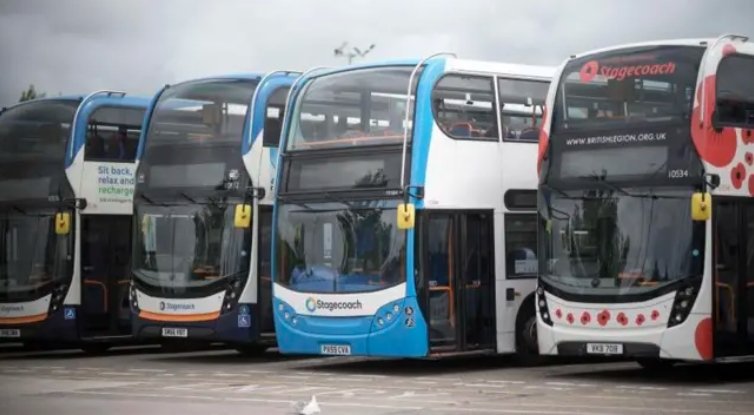The long-running Stagecoach pay dispute that disrupted bus services across Ayrshire and Arran has officially ended after hundreds of drivers accepted a new pay deal, securing an 11.5% uplift in basic wages.
The agreement brings a close to a strike that began on 9 June and followed months of tension between Unite the Union and Stagecoach West Scotland, which operates routes across much of the region.
Pay Deal Ends 2024–2025 Dispute
The accepted offer marks a significant improvement on the company’s earlier proposal of a 4% raise, which Unite had rejected as “unacceptable.” Under the newly approved terms:
-
Basic hourly pay will rise from £13 to £14 retroactively from January 2025.
-
It will increase again to £14.50 in February 2026, remaining in place until July 2026 when the next round of negotiations is scheduled.
Unite confirmed that the new pay package reflects an 11.5% increase overall and said the deal will improve conditions for 430 bus workers across depots in the west of Scotland.

Drivers “Stood Firm for Decency and Fair Pay”
Unite General Secretary Sharon Graham praised the workers’ resilience:
“Our members took a brave stance to strike for what they deserve. This dispute was about more than money—it was about decency and fair pay. They’ve now secured an improved offer through collective strength.”
Siobhan McCready, Unite’s industrial officer, echoed the sentiment, saying the deal “represents significant progress” and ensures drivers are “finally getting pay that reflects the job they do and the cost of living challenges they face.”
Stagecoach Relieved as Services Return to Normal
In a statement, Stagecoach said it was pleased that drivers had voted to accept the revised offer and that services would resume normal operation. The operator had run a reduced timetable during the strikes, causing widespread disruption for commuters and local communities across Ayr, Kilmarnock, Irvine, and other key towns.
The company had previously argued that raising pay beyond their initial offer could risk the viability of some rural or lower-ridership routes. Unite had countered that drivers in Ayrshire were among the worst-paid in the company nationwide, making the fight for higher wages both urgent and justified.
Background: From One-Day Walkouts to Full Strike Action
The dispute dates back to late 2023, when negotiations over pay began. Unite rejected Stagecoach’s 4% pay rise offer in November, setting the stage for escalating industrial action:
-
Three one-day strikes in May and early June provided early warning of the growing unrest.
-
On 9 June, drivers launched continuous strike action, forcing widespread timetable cuts and causing delays for thousands of passengers.
The eventual resolution came just over a week into the indefinite strike, after Stagecoach put forward the new proposal. The union suspended walkouts on Wednesday, June 19, ahead of a formal acceptance vote by members.
A Win for Industrial Action?
The Stagecoach outcome will likely be watched closely by other public transport and essential service workers across Scotland and the UK, many of whom have been engaging in or considering similar strike action amid ongoing cost of living pressures.
Unite, which has been active in several high-profile labour disputes, is expected to use the result to bolster its case in future negotiations across the transport sector.


















